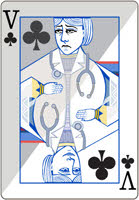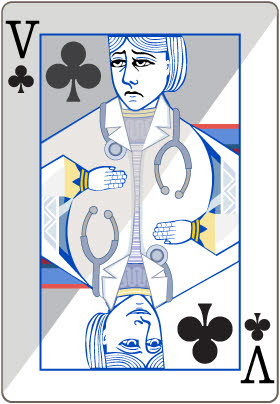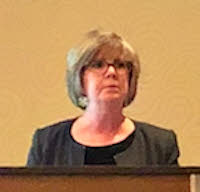

Digital art by Tamara Rees
Source: Adobe Stock by bobyramone
Veterinarians in the United States on the whole are no more stressed out than the general population, but male practitioners under age 45 and female practitioners of all ages have higher rates of serious psychological distress, according to the results of a survey released today.
Even those doing well personally see a bleak future for upcoming generations: Only 41 percent would recommend their profession to a friend or family member, the survey found. The endorsement rate drops to 24 percent among those age 34 and younger.
The study was led by Brakke Consulting, an animal health management consulting firm, in collaboration with the American Veterinary Medical Association and independent researchers in social work and in the science of happiness. The study is dubbed the Merck Animal Health Veterinary Wellbeing Study because the work was funded by Merck Animal Health, a pharmaceutical company.
Dr. Linda Lord is one of three members of the study team who presented the findings today at the 2018 Veterinary Meeting & Expo (previously known as the North American Veterinary Conference) in Orlando. Now representing Merck, Lord is a former small animal practitioner and faculty member at The Ohio State College of Veterinary Medicine, where she was an associate dean until early 2017.
"We know veterinary medicine is a stressful career. We deal with life and death," Lord said in a telephone interview before the presentation. The research takes a close look at that stress and identifies "concerning trends," Lord said, particularly among younger veterinarians. "Clearly, we have some challenges."
Researchers have explored for decades whether suicide rates are higher among veterinarians relative to other occupations. A study published in 2010 found that to be the case in Britain.
In the United States, results of a survey of veterinarians in 2014 suggested that nearly one in 10 experienced serious psychological distress — a marker of the mental-health state — and more than one in six had contemplated suicide since graduating from veterinary school. That survey was conducted online and drew 10,254 responses. A physician at the U.S. Centers for Disease Control and Prevention led the research effort.
The Merck survey, conducted online in November, drew 3,540 responses. It found a much lower instance of serious psychological distress, at a rate of about one in 20, comparable to that of the general population. Although the number of participants in the Merck survey was much less than in the CDC survey, Lord said Merck respondents were not self-selected, an element that can bias the results. The respondents came from a pool of 20,000 veterinarians belonging to the AVMA who were randomly selected to receive invitations to participate. As an incentive to answer the survey, respondents were entered into a raffle for 20 $100 gift cards. The responses were weighted based on age, gender and geographic region in order to mirror the demographics of the veterinary population.
Lord said John Volk, an analyst at Brakke, led the project. The research team included Elizabeth Strand, an associate professor at the University of Tennessee and founding director of Veterinary Social Work, a program at the university; and Ulrich Schimmach, a professor of psychology at the University of Toronto with expertise in the scientific understanding of happiness. The survey was administered by Kynetec, a market research firm. The team has not released a written report but plans to publish an executive summary in the Journal of the American Veterinary Medical Association.
In addition to examining mental health, the study assessed well-being, as indicated by individuals' satisfaction with their lives.
While mental illness among veterinarians was found to be no more prevalent than in the population at large, when it comes to well-being, veterinarians are faring somewhat worse than the general public.
To measure well-being, the Merck researchers used an index by which respondents were classified as flourishing, getting by or suffering.
Looking at the responses of younger male veterinarians, younger female veterinarians, older female veterinarians and older male veterinarians, stark differences emerged: "The only ones who are flourishing are male veterinarians over the age of 45," Lord said.
Overall, 9.1 percent of veterinarians were classified as suffering, compared with 7.3 percent of the general population, Lord said. For female veterinarians, the rate was 10.7 percent. Measures of the general population are drawn from University of Michigan research known as the Panel Study of Income Dynamics.
Younger respondents regardless of gender experienced trouble at a higher rate: Of those age 18 to 34, 11.7 percent were classified as suffering, compared with 7.3 percent in the same age group in the general population. Among those age 35 to 44, 12.3 percent were classified as suffering, compared with 8.1 percent in the same general-population age group.
Student debt a 'critically important issue'
Younger veterinarians today are understood to be under particular pressure owing to rising levels of debt they take on to pay for their veterinary education. In 2016, the average debt of veterinary-school graduates was $167,535 among those with debt, which constitutes the large majority of students. Many owe in excess of $200,000, and debt levels of $300,000 and even $400,000 are not unheard of.
Two-thirds of survey respondents rated high student debt as a critically important issue. The financial burden appears to take a psychological toll.
Linda Lord

Photo by Jordan benShea
Dr. Linda Lord and other research team members presented the study findings today at a veterinary conference.
"If you look at the group with no debt compared with some debt, you see huge differences [in mental health]," Lord said. Among veterinarians with no debt, 3 percent of respondents were found to be psychologically distressed. By comparison, among those with debt, the proportion in distress ranged from 9.2 percent to 11.3 percent.
Intriguingly, rising debt levels did not necessarily correlate with rising levels of psychological distress. The rate was 9.5 percent for those with less than $100,000 in debt; 11.3 percent for those with debt between $100,000 and $199,999; and 9.2 percent for those with $200,000 or more in debt.
Still, heavier debt may well bring on heavier financial stress. That's the observation of Dr. Anthony Bartels, director of debt education at the Veterinary Information Network, an online community for the profession. Bartels works regularly with individual veterinarians to help them manage their debt and personal finances. From what he's seen, the amount of stress caused by debt is directly proportional to its size.
"Whether or not that leads to psychological distress really depends on the individual," Bartels said. "Regardless, managing a heavier debt load requires more resources and more careful planning long-term, as it consumes a higher proportion of your available income."
Bartels believes that using figures that downplay the magnitude of student debt may unwittingly contribute to the profession's stress problem. For an example of downplayed statistics, he pointed to Merck's news release about the study, in which the average veterinary school debt is presented as $138,000 in 2017. The figure factors in students who graduated with zero debt and does not count the debt of Americans who attend veterinary schools in the Caribbean or other overseas programs and return to the U.S. to practice.
"If the majority of folks actually had anything near the $138,000 'average' debt reported, 67 percent of them wouldn't list student debt as a 'critical issue,' in my opinion," Bartels said. "As the debt levels rise beyond the $200,000, $300,000 and $400,000 ranges, the management becomes much more challenging and complex."
Lord said she couldn't comment on what debt figure is best to cite but regardless, veterinary-student debt is too high, she said. "It's approximately two times starting salary, and we know that's a strain."
New pressures
Debt aside, the fact that younger veterinarians are suffering more than older ones does not surprise Dr. Michele Gaspar, a psychotherapist in Chicago who spent 23 years in veterinary practice.
"I do believe that younger veterinarians are probably more at risk for issues of depression and anxiety for a number of reasons," she said. "One, of course, is financial concerns, but more importantly, they're really just getting their feet wet in the profession, and it takes time to figure out how to be a doctor. It's not unusual for people to have a concept that the profession is 37 hours in the week, when it's actually far more than that."
Gaspar posited that younger veterinarians today might be subject to more stress than their predecessors due to the growing prevalence of consolidated corporate practice. "I think younger veterinarians, probably more than my generation, are beholden to metrics," she said. "I think as corporate practices come online, there are more expectations. Not that we were without expectations, but with salaries tied to production and in-house referrals [for services such as ultrasounds, blood work and radiographs]," the pressure is greater, she said. "These are things I hear from people in the trenches."
Susan Cohen, a social worker in New York who has worked with veterinarians for 35 years, noted that an increase of slots in veterinary schools and stepped-up competition in veterinary practice is adding pressure on veterinarians that starts in school and continues well into their careers.
In school, Cohen said, "they're producing more veterinarians than ever before, so more people are going for post-doc training. You're now competing with interns and residents for hands-on experience. ... What I'm hearing is, people coming out of vet school are feeling less confident about their skills."
As veterinarians proliferate, competition for business increases, causing practice to become more intense and doctors to feel "constant pressure to sell more product and work more hours," Cohen said.
Added to that, she said, is the pressure on practices to keep up a social-media presence, plus the risk of being harangued by unhappy clients on social media.
Antidotes to distress
On the positive side, the Merck study found that activities associated with greater well-being include spending time with family and friends, and giving time to hobbies and recreation, Lord said. "These are things we can work on," she said.
Cohen agreed. Noting that veterinary schools now commonly teach stress management, she said, "People need to take that to heart and put some time in their own self-care." They also need to learn to negotiate for the time they need to take care of themselves, she added.
The survey finding that human connection promotes well-being is consistent with Gaspar's observations. Among those in distress, she said, "I hear an overwhelming loneliness."
Compounding the problem, many troubled veterinarians aren't seeking help. The survey found that only half of those in serious psychological distress had sought treatment, and only 16 percent had ever accessed mental-health or wellness resources offered through national or state veterinary organizations.
Eight years ago, in an attempt to alleviate some of the loneliness within the profession, Dr. Bree Montana joined with colleagues to create a confidential support group called Vets4Vets. Offered through the VIN Foundation, VIN's nonprofit counterpart, Vets4Vets provides free crisis counseling and ongoing support to veterinarians anywhere in the world.
Montana, a practice owner in California with 26 years in the profession, is on the front lines: She takes the first calls from fellow veterinarians in trouble. Often, she's found, just having someone to listen and sympathize is all the person needs at that moment.
While talking to "people who are going through hell," Montana tells them she gets it. "In my life, I've gone through some challenging times. Man, I've walked on a super craggy beach," she said. "They start crying, at some point, they're laughing, they're laughing and crying. It's a nice conversation and almost always a nice connection. Even if they don't [want any further help], it's just like, they're not alone."
Montana said about 300 people a year have contacted Vets4Vets during the past two years. Despite her regular exposure to colleagues' unhappy times, she said, "I feel positive about veterinary medicine." She doesn't believe the distress is new. "I think we're just hearing about it more."
Still, some things have changed, so Montana understands why many veterinarians don't recommend the career. "I'm super cautious about encouraging people to come into this profession as a doctor because the cost/benefit is not what it used to be," she said.
The key to satisfaction, she believes, is pursuing the profession with "eyes wide open" — fully recognizing from the start that the schooling is expensive, the hours are long and the daily dealing with life and death can take an emotional toll.
Cohen said aspiring veterinarians should consider their own psychological vulnerabilities before they commit to the occupation. "If you know before you get into it that you struggle with anxiety and depression, don't go into this field," she said.
Educators and others who work with would-be veterinarians have a role to play, too, Gaspar said. "I think a lot of the prevet work needs to be in deglamorizing the profession," she said. "I personally feel that there are few professions that provide ... validation, the ability to have a meaningful life, to actually do good. Veterinary medicine does. But there are significant challenges to the profession.
"Many are called," Gaspar mused, "but maybe fewer should be chosen."